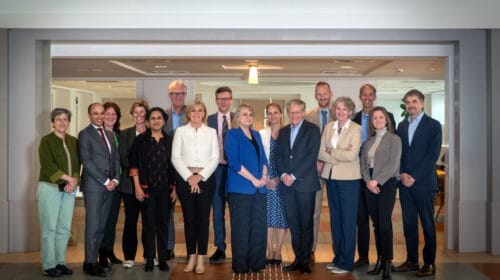Exploring incentives for the Nigerian creative and entertainment industry
The Nigerian entertainment and creative industry have experienced massive growth over the last decade. According to the International Monetary Fund (IMF), the entertainment industry now accounts for 1.45% of Nigeria’s GDP.
In 2016, the Arts, Entertainment and Recreation Sector generated N239billion in revenue, culminating in about 2.3% of Nigeria’s GDP for that year. Nollywood, which is the movie production subsector of the entertainment and creative industry, is globally recognised as the second largest film producer in the world, coming behind America’s Hollywood and ahead of India’s Bollywood.
The number of film production annually, stands at around 2500 with a projection of US$22million by 2021 for total cinema revenue alone, while the total music revenue in Nigeria is estimated to rise to US$73million by 2021 (with a compound annual growth rate of 13.4%). The entire industry currently employs about a million people and this number is expected to increase before the end of 2021. Furthermore, it is also expected to generate about $7 Billion for the national economy.
The popularity that the industry has garnered over the years has seen Nigerian artists collaborating with their foreign counterparts and striking multimillion-dollar music recording and publishing deals with international record publishing companies such as Sony Music Group, Universal Music Group, Warner Music Group, and a host of many others.
As a result of its successes in the local and international markets, in 2018, global streaming giant, Netflix acquired worldwide rights to Lion Heart, a Nigerian movie directed by Genevieve Nnaji. In that same year, Netflix announced that it will be putting out $8 Billion original budget to work in Nigeria’s movie industry. In furtherance of this, in February 2020, Netflix made its official debut in Nigeria, acquiring and distributing Nigerian filmed content.
Since then, it has gone ahead to acquire several Nigerian movies, including the Wedding Party, Elevator Baby, Oloture, King of Boys, It’s her day and a host of others. Currently, Nigerian movie producers are able to enter into publishing and streaming deals with Netflix for their local content. Local movie streaming platforms have also emerged, with Iroko TV being a key player in this regard.
International award platforms are beginning to recognise Nigerian acts, with the latest and most prolific being Burna Boy’s consecutive Grammy nominations in 2019 and 2020 for his albums African Giant and Twice As Tall, and a subsequent win in 2021, for the later album (Twice As Tall). In recent times, more of the award categories and nominations allotted to African music at the Black Entertainment Television (BET) Awards, the Music Television (MTV) Awards, the Grammy Awards and even the Netherlands’ Eddison Awards, have been clinched by Nigerian artistes. Furthermore, Nigerian artistes are beginning to garner massive streaming numbers on various international music streaming platforms like Spotify, Apple Music, Audiomack, Youtube and Boomplay. Local music streaming platforms like UduX and Gbedu have also emerged. These developments suggest that Nigerian artistes and their songs are beginning to have a considerable space in the world music scene.
Read also: Thou shalt not advertise – the line between business development and solicitation
Challenges and the way forward
Despite the level of growth that these sectors have experienced, it has been beset by lack of funding, piracy, and copyright infringement, among other issues currently plaguing them. The sector barely receives support from the government and investors (despite being made subject to various taxes and levies by the various tiers of government). As a result of this, investors are hardly keen on investing in this sector.
In a bid to support the entertainment industry in 2010, Former President Goodluck Ebele Jonathan at the 30th Anniversary of Silverbird Group announced a $200million donation to support Nollywood. The sum was to be distributed to the players in the sector in form of loans, and it was to be administered by the Nigerian Import and Export Bank (NEXIM Bank) and the Bank of Industry (BOI).
Similarly in 2012, at the 20th-anniversary celebration of Nollywood, another announcement of a N3billion grant tagged “Project Nollywood”, was also made by Former President Goodluck Ebele Jonathan and it was supposed to be managed and distributed by the Ministry of Finance in collaboration with the Ministry of Culture and Tourism.
However, how these support funds were utilized remains undetermined as several Nollywood stars have stated that they did not receive the said funds as promised. Along the same lines, the BOI in 2015 denied receiving the $200 Million donation from the former president.
In a similar vein, to contribute to the entertainment and creative industry, the BOI initiated a N1billion special facility for Nollywood, known as “the BOI Nollyfund”. The intervention was initiated by BOI for the following reasons: Nollywood is a very important emerging sector in the economy; it contributed 1.42% ($7.3 billion or N1.4 trillion) to Nigeria’s Re-based GDP in 2013; it has contributed to enhancing the image of Nigeria as Nollywood movies are being watched globally, and Nollywood is now ranked 2nd in the world after Hollywood (America) and ahead of Bollywood (India) in terms of the number of contents produced.
However, the terms and conditions for accessing the funds appear to be quite strenuous. These conditions include the assigning of copyright as collateral for receiving the funds and the requirement for a distributor to issue an undertaking to remit all cinema proceeds of the film based on agreed arrangements, to BOI designated banks. These conditions amongst others appeared to be unpleasant to the industry practitioners.
Interestingly, the current administration is also taking steps to contribute to the creative sector. This is being achieved in collaboration with the African Development Bank (“the AfDB”) through a $500million facility (“the Facility”) for the tech and creative sectors. This initiative will see the injection of the said Facility into the aforementioned sectors, before the end of 2021. Accordingly, an arrangement is already being made for the Facility to be utilized through the Nigeria Innovation Programme (NIP), which was proposed by the federal government to boost innovation and job creation, and foster growth in the technology and creativity entrepreneurship ecosystem. It is excepted that this facility will bring about further development to the already booming creative industry.
Pioneer Status Incentives
It is however important to note that there are other ways in which the government can support the entertainment industry apart from making and establishing donations and support facilities. A major way in which the government can make the entertainment industry attractive is in the provision of various incentives to the entertainment and creative industry.
As a matter of fact, in 2017, the Federal Government included the creative sector on the pioneer status incentive list, as a way of contributing to its development. Pioneer Status Incentive (“PSI”) is a tax holiday incentive provided for under the Industrial Development Income Tax Relief Act (“the Act”). It grants qualifying industries and their products relief from the payment of corporate income tax for an initial period of three years, which is renewable for another one or two additional years.
Section 1 of the Act provides that any industry may be designated as “pioneer” where the president is satisfied that it is not being carried on in Nigeria on a scale that is suitable to the economic requirements of Nigeria or at all, or there are favourable prospects of further development in Nigeria or it is expedient and in public interest to encourage the development or establishment of such industry in Nigeria by declaring the industry to be a pioneer industry and any product of the industry to be a pioneer product.
It is indubitable that tapping into this is beneficial for the entertainment and creative industry as the PSI covers the following: production of digital movies; animation, videos, television programmes, commercials (including online distribution and Exhibition); music production, publishing and online digital music distribution; production of Cameras, motion picture and slide projectors, overhead transparency projectors, and photograph for tourism purposes and aerial photography.
To this end, any organisation engaged in any of the aforementioned businesses is required to apply to the Nigerian Investment Promotion Commission (“NIPC”) for a Pioneer Status Certificate (PSC), in order to enjoy the PSI.
This is a positive step because as earlier noted, the qualifying media and creative practitioners are entitled to relief from the payment of corporate income tax at 30%, for an initial period of three years which is renewable for one or two additional years. Consequently, this may aid in reducing the cost of doing business for these entertainment and media practitioners. Furthermore, it will make the entire industry attractive to foreign and local investors.
Though the inclusion of the creative and entertainment industry on the pioneer status list demonstrates the Federal Government’s willingness to support the entertainment and creative sector, there are however certain drawbacks that must be considered.
First, the service fees for the application for a PSI in Nigeria appear to be exorbitant. Applicants are required to pay an application fee in the sum of N200,000 (Two Hundred Thousand Naira), then a service charge deposit of N2,500,000 (Two Million, Five Hundred Thousand Naira) is also required to be made. In addition, 1% of the actual pioneer profits will be paid annually and due diligence fee of N500,000 (Five Hundred Thousand Naira) is required to be paid. In case of a renewal, an application fee of N100,000 (One Hundred Thousand Naira) is required to be paid and 1% of the actual pioneer profits will be paid annually.
The primary drawback with these charges is that the small players in the creative and entertainment industry may not be able to access these incentives and this may defeat its essence and purpose.
Secondly, the processing time for fresh applications often takes up to twenty-five weeks, while an application for renewal/extension takes an average of fifteen weeks to finalise. This is barring any delays that one may experience with the applications.
This inordinate delay experienced in obtaining the PSC serves as a drawback and barrier as it makes it extremely difficult for practitioners to access this incentive. Some may consider the level of strain involved and simply call off the desire to obtain a PSI.
Consequently, we opine that the government must take reasonable steps to ensure that the PSI is obtainable at a convenient cost while putting the small players in the entertainment and creative industry into consideration. The government must also consider placing the entertainment and creative sector under the investment tax credit incentive which is available in other sectors. This will give investors the impetus to consider investing in the entertainment and creative sector.
Furthermore, just like the Tourism Incentive and the Agricultural Production Income Tax Exemption, the government must begin to consider entertainment and creative industry-based incentive. This is already obtainable in the United States of America where movie producers are entitled to movie production incentives.
Conclusion
The contribution of the entertainment industry to Nigeria’s economic and social growth cannot be underestimated. The industry has been responsible for the creation of over a million jobs and it is still creating more jobs for Nigerians; albeit the sector barely enjoys support from investors and from the government.
If the entertainment industry is able to get the adequate support it needs, it is indubitable that the quality of the content being produced and released yearly will improve. Fortunately, this support is not limited to the provision of grants and loans as the government can also explore other means like the provision of various incentives to the industry.
Hence, the issues pertaining to the application for PSI must be addressed and the government must also seek to establish an entertainment & creative industry-based incentive as well as include the entertainment & creative industry on the list of sectors eligible to access the investment tax credit incentive.





